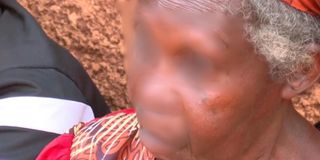Premium
Kirinyaga killer brew: Villagers torch bar linked to deaths as toll rises to 10
Angry Kangai villagers in Kirinyaga County on Wednesday morning torched the bar linked to the death of 10 people after consuming an alcoholic drink believed to have been laced with ethanol.
The residents stormed a bar owned by a local tycoon at dawn, destroying property before setting it ablaze. During the morning raid, crates of beer, tables and other property were destroyed.
Police arrived shortly after the attack to find the building reduced to ashes.
Six people died on Tuesday while four more died on Wednesday, bringing to ten the number of people who have so far lost their lives after drinking the illicit brew.
Central Regional Commissioner Fredrick Shisia said the owner of the bar would be charged with murder. He said the main suspect had been arrested and was being questioned at the local police station.
"The suspect killed 10 people and will be charged in court soon," he said in Kangai village. He urged the police to work closely with other government agencies to tame the rogue brewers.

Some of the victims who lost their sights after consuming illicit brew in Kangai village, Kirinyaga County.
The revellers entered a local bar on Monday night and ordered the drink, which they enjoyed while chatting before heading home.
However, in the early hours of Tuesday morning, the victims began complaining of stomach pains and vomiting. Five of the victims died at home in the afternoon, while the sixth died on arrival at Kerugoya County Referral Hospital, where he had been rushed by relatives.
According to county officials, the bar that sold the deadly liquor was unlicensed.
Sports, Culture and Social Services Executive Dennis Muciimi revealed that the County Liquor Licensing Committee had rejected the bar's application for a licence in December last year.
Mr Muciimi said the application for the bar licence was rejected based on allegations of selling illicit brew, insecurity and poor sanitation.
"This particular outlet was operating illegally, it was not licensed by the county government because it did not comply with the County Alcoholic Drinks Control Act No. 3 of 2014 and all the requisite regulations," Mr Muciimi said.
He said the county has a stringent liquor licensing system which is meant to protect consumers of alcoholic beverages by ensuring fair and ethical business practices in the production, distribution, promotion and sale of alcoholic drinks.

The county Health Executive George Karoki, said the five who lost their eyesight were being treated at Njegas Health Centre.
Dr Karoki said the victims were brought to the hospital with symptoms of blurred vision, which is an indication of cirrhosis and other nervous system problems.
"We suspect that they may have consumed an illicit brew with a high content of ethanol, we know very well that this type of chemical will cause problems in the liver," Dr Karoki said.
Mwea West Deputy County Commissioner Teresia Wanjiku said the owner of the bar had been arrested and taken to court on several occasions for selling illicit brew and operating an unlicensed liquor outlet, only to be released for lack of evidence.
Ms Wanjiku said attempts to close down the bar had been frustrated by the court and the owner.
"We have arrested and taken the owner of this bar to court almost 10 times and were planning to transfer our cases from the Baricho Law Courts to Wang'uru because the suspect always seems to get a favourable judgement," she said.
In a statement on Wednesday, the National Authority for the Campaign Against Alcohol and Drug Abuse (Nacada) said preliminary reports showed that the deaths occurred as a result of the consumption of an unidentified substance, the contents of which are yet to be determined.
The agency urged the public to avoid consuming alcohol whose quality cannot be verified.
"The Authority continues to work closely with the National Government and other law enforcement agencies to intensify the crackdown on substandard, illicit and counterfeit alcohol to safeguard the public from harmful alcohol," said Nacada Chief Executive Officer Anthony Omerikwa.
Mr Omerikwa called on members of the public to report any suspected trade in illicit alcohol and drugs.
He appealed to county governments to exercise their devolved licensing mandate to control the proliferation of bars and wines and spirits outlets, many of which do not meet the required operating standards.






